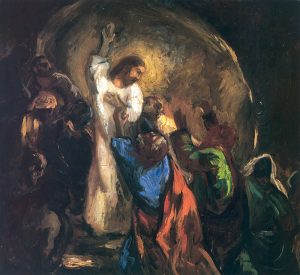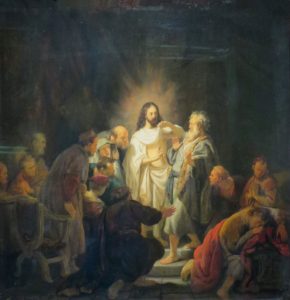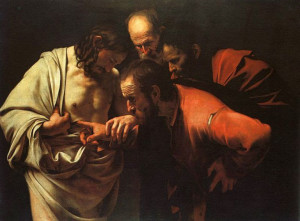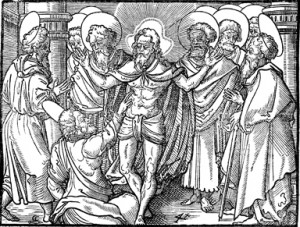Illuminations on the Lectionary readings for April 27, 2025 (Easter 2C)
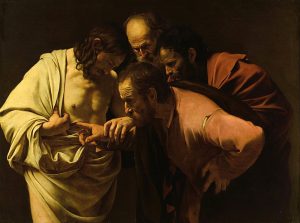
The Incredulity of Saint Thomas (c.1601-1602), oil painting on canvas by Michelangelo Merisi da Caravaggio (1571-1610). Sanssouci Palace, Potsdam, Berlin, Germany. (Click image to enlarge.)
First Reading: Acts 5:27-32
Jesus has died and Christ has risen, but tension continues between Christ-followers and the Temple establishment. We’ll be hearing passages from the Acts of the Apostles as our first readings during Eastertide. In Sunday’s reading we learn that the apostles have continued teaching, preaching and healing in Jesus’ way, and all this uproar has the authorities worried that these efforts are going to bring trouble. In the verses before these, we read that they locked Peter and the apostles in jail, but an angel set them free. Now the authorities try persuasion instead, but the apostles, recognizing a higher mission, push back: God has called them to spread the Word, they say; and that mission trumps any human authority.
Psalm: Psalm 118:14-29
Portions of Psalm 118 have seen us through these holy days, as the Lectionary returns to parts of its verses on Palm Sunday, Easter Sunday, and now the Sunday after Easter. Once more we chant the covenant accepted by Moses at Mount Sinai, a commitment that Jesus also taught. We pledge to practice justice in our lives; to serve God, our neighbor, the poor and the stranger, seeking through righteousness to enter the glory of God. Finally the psalm addresses God directly: Giving thanks for God’s abundant love, our lives and our salvation, we sing, “Blessed is the one who comes in the name of the Lord.”
Alternate Psalm: Psalm 150
Throughout the year, in Sunday liturgy and daily prayer, we turn to the Psalms almost every time we gather to worship. Some Psalms cry out in lamentation; some ask God’s blessing. Psalms beg forgiveness and express hope; a few even call down God’s wrath. The most joyful Psalms sing God’s praise. Psalm 150, the last Psalm, brings the book to a ringing climax as we sing out God’s glory with flutes and harp, strings and praise and plenty of loud, clanging cymbals. We sing out loud as we celebrate the resurrection during Eastertide.
Second Reading: Revelation 1:4-8
Despite the commercial success of the popular “Left Behind” stories and other interpretations of Revelation as scary prophecy for modern times, Revelation was never meant for our modern ears. In its time, the late first century, it was addressed to the Christians of seven cities in Asia Minor (now western Turkey) that faced oppression by Roman power. The letter, written in the apocalyptic genre, a sort of First Century sci-fi and fantasy, used symbolic language and colorful metaphors to reassure these early Christians that the Reign of Christ was still to come and would set them free. Christ is “the ruler of the kings of the earth,” it promises, holding up that glowing hope that Christ would eventually dominate even the Emperor of Rome.
Gospel: John 20:19-31
In John’s version of the resurrection, when Mary Magdalene alone saw the risen Christ, she ran back to tell the other disciples. It appears that they did not react immediately with celebration, though, but – as Sunday’s Gospel begins – they had gathered and locked all the doors, apparently fearful that the Temple authorities who had worked with Pilate to condemn Jesus were trying to find them. But then Jesus appears in the locked room with them, shows them his wounds, offers them peace, and breathes the power of the Holy Spirit into them, turning their fear into joy. Thomas, who wasn’t with the apostles that night, was doubtful, insisting on proof before he would believe. But Thomas, too, turns from doubt to belief when he sees Jesus.

